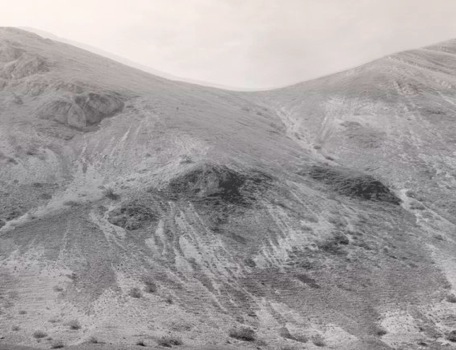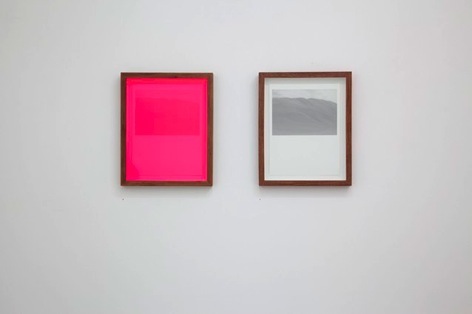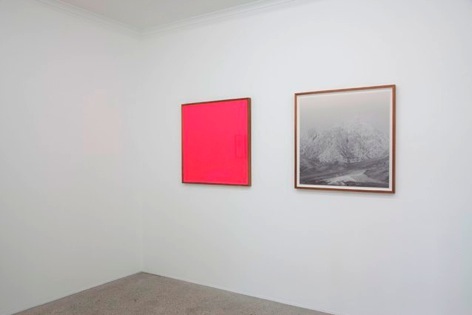Isobel Philip looks through the veil into Sarah Mosca’s opaque worlds…
In her exhibition, New Works, at Galerie pompom, Sarah Mosca composes a soft-spoken yet captivating portrait of her father’s birthplace in rural Italy. Her black and white photographs of mountains and valleys have been carefully arranged around the small room. There is nothing unconsidered about their layout – the dialogue between adjacent and opposite images carries its own refined syntax and rhythm. But this dialogue does not simply speak to the genre of landscape photography. It is more complicated than that.
Sarah Mosca, Untitled (Mound), 2012, digital pigment print, 30 x 38 cm.
With her photographs of a largely uninhabited alpine landscape, Mosca constructs a compelling study of the way we know, and occupy, the places that appear in the narratives of our own personal history.
These photographs play with the viewer and complicate the act of looking. Some have been gently modified – in Untitled (Mound) two versions of the same image are superimposed on top of one another but are slightly misaligned – while others are doubled and displayed as twin sets where one photograph is overlaid with a piece of pink Perspex.
Sarah Mosca, New Works, installation view, 2012.
By altering and obstructing the way the viewer interacts with the landscapes in her photographs, Mosca defines her relationship to this place – a place that belongs to distant memories, existing in two time zones; the past (her father’s past) and the present. Perhaps this is why we find these landscapes constantly doubled and repeated, whether within a single frame or across two separate images. Perhaps this repetition attends to the schism between a place that we know through memory (even if the memory belongs to someone else) and its reincarnation in the present.
What, then, can we make of the pink Perspex?
It is a screen (a mask, a veil) that must be looked through, an aperture that not only mediates but also transforms our perception of the work. This semi-transparent barrier – both a frame and an obstruction that conditions our relationship to the image – is an echo of the screen that colours Mosca’s own experience of this place, a poetic iteration of her inherited memories. She sees this landscape through her father and his past.
But while memory – Mosca’s screen – frames a relationship to the land, it is also an obstruction. For how is it possible to establish a connection to a place that exists purely in the past tense? Does this place even exist any more, or has it disappeared?
The work itself appears to initiate such questions – these are washed out landscapes, faint imprints in shades of grey. In Untitled (Pause) the mountain dissolves completely into the white of the paper while the print that lies on a table in the middle of the gallery has been stripped of its image. Here, the landscape has receded into a monochromatic grey rectangle.
To look at these works – images at the edge of erasure and encased beneath a veil of pink Perspex – is to performatively reimagine the act of encountering a place we recognise from a past life (or a memory) that has become vaguely foreign over time. It is to tread carefully along the ambivalent line that separates familiarity and the unknown.




Pingback: To Revisit | isobelparkerphilip.com